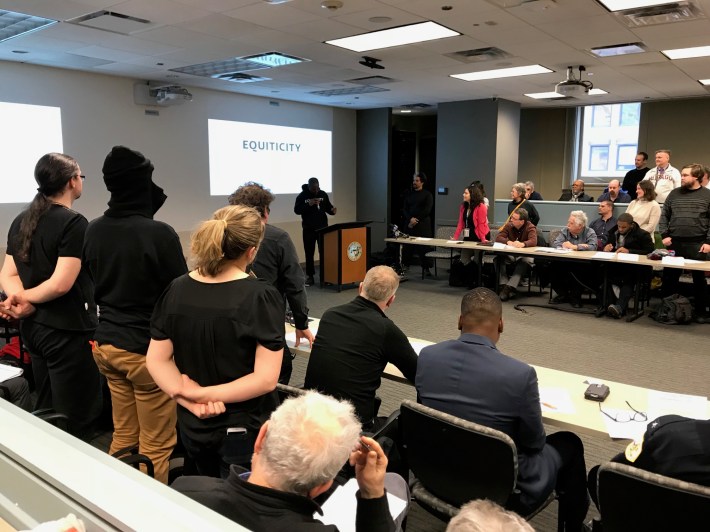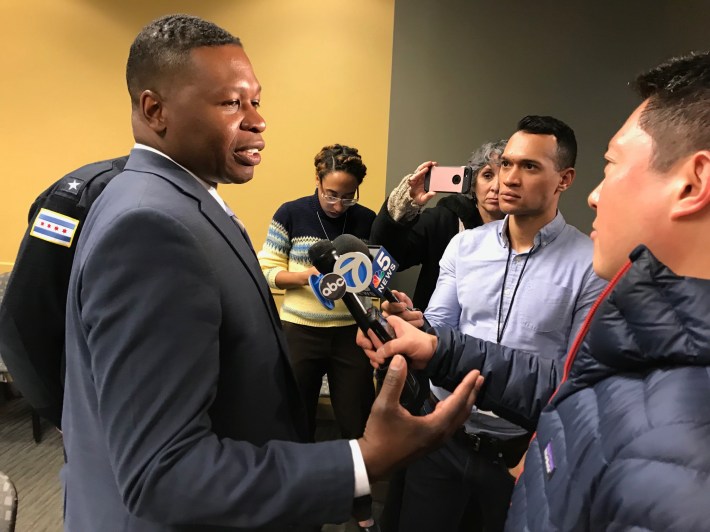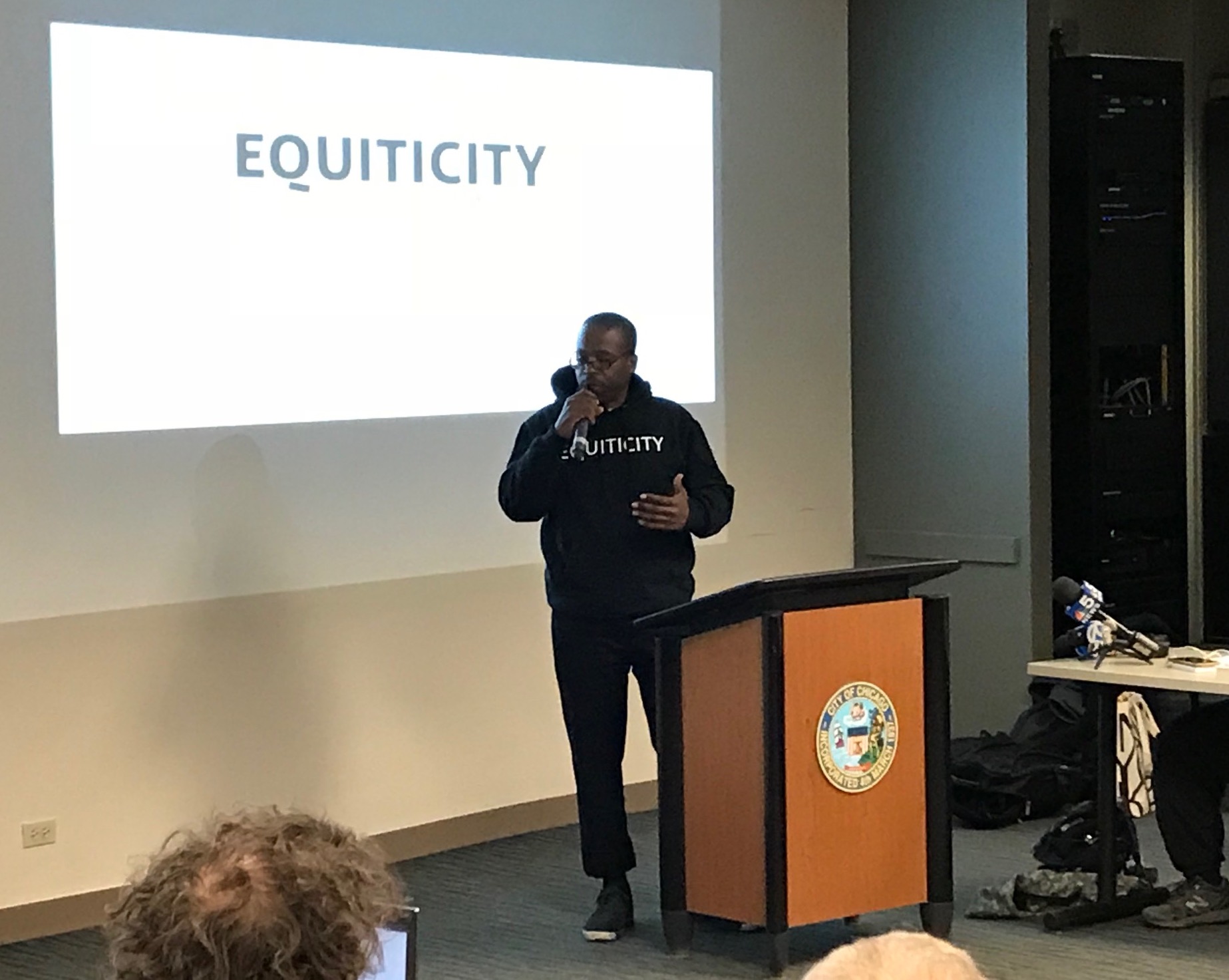Before a full house at this afternoon’s Mayor’s Pedestrian Advisory Council meeting, Oboi Reed, leader of the transportation justice group Equiticity, passionately argued that the Chicago Police Department’s practice of concentrating bike tickets in Black neighborhoods is the city’s most pressing bike issue. Reed added that city officials’ failure to solve the problem after previously telling bike advocates of color that the practice had stopped, along with the Chicago Department of Transportation’s initial resistance to discussing the subject at today’s meeting, represent “paternalism and bias.” In response, a police representative present argued that racism is not necessarily a factor in the ticketing patterns, but committed to working with community members to solve the problem.
Last month the Chicago Tribune’s Mary Wisniewski reported that, almost a year after she first uncovered massive discrepancies in the number of bike citations written in African-American communities versus majority-white ones, new numbers showed that little has changed. For example, in 2017 police wrote 397 bike citations in North Lawndale while – for the second year in a row – only five tickets were issued in Lincoln Park. Overall, 56 percent of bike tickets were written in Black neighborhoods, 24 percent were issued in Latino communities, and only 18 percent were written in majority-white neighborhoods, despite the fact that each group makes up about a third of Chicago’s population.
After the second Tribune report came out, Reed, who also cofounded the bike equity group Slow Roll Chicago, blasted the city for the lack of progress in a long thread on Twitter detailing advocates’ efforts to confront the ticketing problem. He noted that Black advocates met with representatives of the mayor’s office and CDOT in September and were assured that the issue had been resolved.
On February 28 Reed announced on Facebook that he had recently requested time to speak about the issue at today’s meeting but was told that the agenda was full. In response, Reed created an Equiticity Facebook event called “Ride for Racial Justice at the Mayor’s Bicycle Advisory Council,” asking supporters to attend the meeting wearing all black to protest the ticketing issue. About an hour after Streetsblog Chicago published an article about the planned protest, CDOT contacted us to say the decision had been reversed and Reed would be allowed to give a speech at the meeting after all.
At today’s meeting, Reed framed his presentation as an open letter to Mayor Rahm Emanuel, police superintendent Eddie Johnson, and CDOT commissioner Rebekah Scheinfeld, who was present. “The unfortunate reality is that the racial profiling of Black cyclists is contributing to reducing the number of Black and Brown people who ride bikes on the South and West sides."
Reed discussed his frustration with the city’s lack of action on the ticketing issue, and the fact that it took the threat of a protest to make CDOT agree to discuss the subject at the meeting. “This reveals that MBAC is broken,” he asserted. “MBAC is pure theater where the CDOT tightly controls the show and the conversation. MBAC tokenizes Black and Brown people [who serve as] community representatives, as they clearly have no power in this structure.” He said that MBAC community rep Deloris Lucas, leader of the Far South Side bike group We Keep You Rollin’, had previously asked that Reed be given time to speak, but her request was denied.
“This reveals that there are not enough Brown and Black people at CDOT, and in particular [in the mayor’s office], in positions of power where decisions around projects, resources, and infrastructure get made,” Reed said. “MBAC was perfectly comfortable having this meeting and not having [ticketing] as a planned topic on the agenda.” He argued that this represents the city’s “ongoing and historic dismissiveness and lack of regard for the concerns that Black and Brown people have.”

Reed added, “A good place to start to start to make some serious operational changes at CDOT is to hire a Black or Brown person to manage Vision Zero,” the city’s traffic fatality prevention effort, which is focused on parts of the South and West sides plagued with high traffic violence rates. Vision Zero manger Rosanne Ferruggia Lubeck announced last month that she was leaving the job.
Equiticity and Slow Roll have repeatedly called for the removal of the elimination of additional traffic policing in community of color as a potential VZ crash reduction strategy in communities of color, citing the CPD’s well-documented issues with civil rights violations. Reed says city officials turned down this request at the September meeting.
Near the end his MBAC speech, Reed noted that Emanuel and Johnson have gone on the record acknowledging that there is racism at the CPD. He added that under Barack Obama the U.S. Department of Justice recommended that the police department be put under federal oversight, which hasn’t occurred due to inaction from the Trump administration. He chronicled Chicago's many incidents of police abuse and other biased enforcement practices, ranging from the Laquan McDonald shooting and cover-up, to racial disparities in snow shoveling and bike lane parking enforcement.
“We will use every tool at our disposal to achieve racial justice and end racial profiling at the CPD,” Reed said. He concluded his speech by asking Equiticity and Slow Roll members to stand up, and then requesting that allies of their racial justice efforts get on their feet to show support. Eventually just about everyone in the packed room who wasn't on the city payroll was standing.
During a Q & A, Peter Taylor, from the predominantly Black bike group the Major Taylor Cycling Club of Chicago, asked Reed what the next step is in the ticketing equity effort. Reed said he plans to target the campaign on Emanuel, “the most important person person for making change here." Reed later added that he has little faith that negotiating with the CPD would be effective, since the mayor ultimately controls department policy.
Another attendee asked what bike advocates who don’t live in the affected communities of color can do to help. “Be a vocal voice for racial justice in our society,” Reed responded. “Support us, protect us.” He added that Equiticity will soon post info on its website about organizing a coalition to fight the ticketing practices.

When CPD director Glenn Brooks spoke at the MBAC meeting, he acknowledged the concerns about bike citations, but wouldn’t concede that there’s a racial bias issue involved. “I don’t know if it’s a wholesale policy of ticketing,” he said. “I can tell you that it’s not a policy that [CPD leadership] has. I understand that there’s a perception of a practice [that may] be an untoward policy.” He pledged to further analyze the CPD’s bike ticketing data – all 150 pages of it – and hold a meeting with police commanders and community stakeholders, likely within the next month or two. “We might be able to come up with some strategies and solutions that mitigate this issue. The most important thing is that people are able to safely ride their bikes, period.”
Later when Brooks was talking with a scrum of news reporters (something that’s never existed at an MBAC meeting before), he was asked if he believes the claims that bike ticketing is being used as an excuse for stop-and-frisk in African-American neighborhoods. “No, that’s not it,” he said. “I don’t think that’s it, anyway. I have [neighboring] districts that are both predominantly Black. In one district you might see an increase [in ticketing] and in the other you might see a decrease.”
Of course, it could simply be the case that in the first district the commander is tolerating or encouraging the use of bike citations as a strategy for searching for contraband, while the other commander is not.





